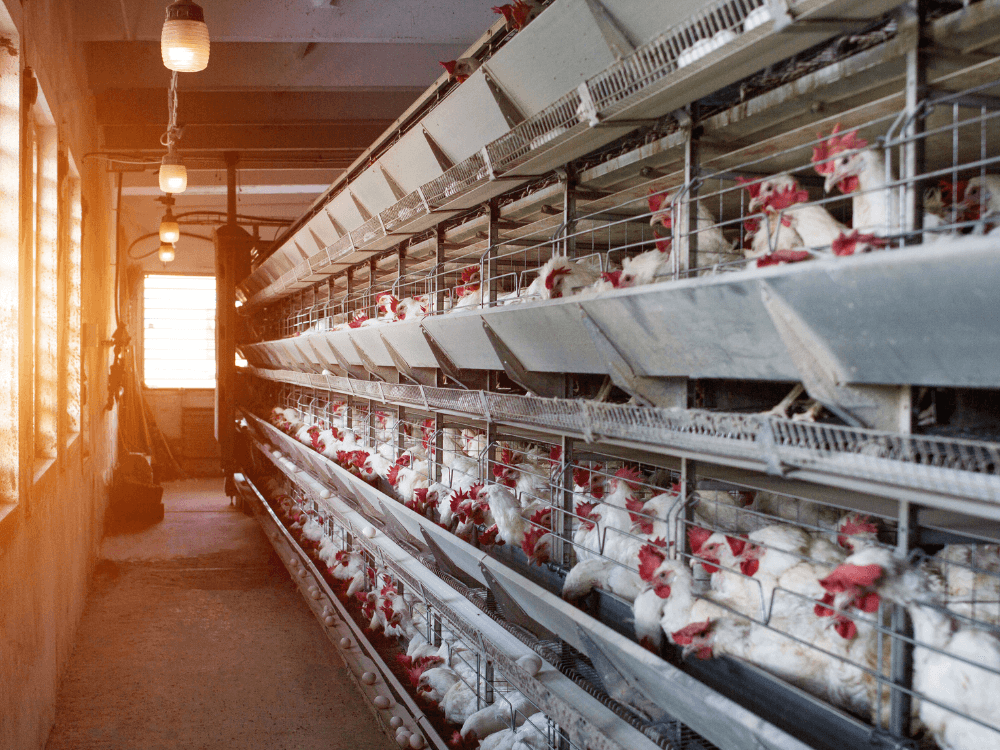Animal suffering in the world today
In the face of an increasingly acknowledged truth—that animals, like us, are sentient beings—global atrocities against animals persist unabated. Billions of animals routinely endure systematic and often brutal exploitation for the sake of human pleasure and profit. The following are just a handful of animal rights violations occurring around the world.
Farming practices
According to One Green Planet, ‘dangerous gases from manure, including high levels of ammonia, cause pneumonia in over 80 percent of the factory-farmed pigs entering U.S. slaughterhouses’. The global prevalence of factory farming contributes to widespread animal cruelty, with billions of animals enduring cramped and unsanitary conditions. Approximately two out of every three farm animals in the world are reared on a factory farm, and an estimated 99% of farm animals in the U.S. are reared on a factory farm. According to the World Animal Foundation, approximately 80 billion land animals are raised for food annually, enduring practices such as intensive confinement and routine use of antibiotics. These methods prioritize efficiency over animal welfare, posing huge ethical concerns and contributing to the degradation of both environmental and animal well-being.

Blood sports and hunting
Various forms of blood sports, such as bullfighting and fox hunting, contribute to the suffering of animals. The League Against Cruel Sports highlights that in the United Kingdom alone, tens of thousands of foxes were hunted annually before the ban on hunting with hounds came into effect in 2005. Additionally, as reported by the World Wide Fund for Nature (WWF), each year, thousands of animals, including lions, elephants, and rhinos, fall victim to trophy hunting, endangering already vulnerable populations and disrupting ecosystems. Despite legal measures in certain regions, loopholes and continued illegal activities perpetuate the harm inflicted upon animals in the name of ‘entertainment’. The ethical implications surrounding these practices underscore the urgent need for stronger conservation measures and the enforcement of stricter regulations to protect animals from unnecessary suffering.

Animal testing
Despite advancements in alternative methods, animal testing remains prevalent in various industries, including pharmaceuticals and cosmetics. Millions of animals, such as rabbits, mice, primates and dogs, are subjected to experiments each year. Critics argue that not only is animal testing inhumane, but it also often yields unreliable data due to species differences. Efforts are being made globally to promote the use of alternative testing methods, such as in vitro testing and computer simulations, in order to minimize the reliance on animals for scientific research. However, the transition away from animal testing faces challenges, as established practices, regulations, and concerns about the effectiveness of alternative methods hinder swift progress.

Climate change and biodiversity loss
Human activities pose a significant threat to animal welfare and biodiversity, with climate change driven by deforestation and fossil fuel use posing severe challenges worldwide. The Intergovernmental Panel on Climate Change (IPCC) notes that climate change leads to habitat loss, altering animal migration patterns and contributing to species decline, disrupting the delicate balance of ecosystems. Additionally, marine life faces a serious threat from pollution, including plastic waste, oil spills, and chemical runoff. These pollutants harm various species of fish, mammals, and other aquatic life, impacting their health and survival through ingestion and entanglement. The interconnectedness of these environmental issues underscores the critical link between animal welfare and overall environmental well-being.

Entertainment
The use of animals for entertainment raises significant ethical concerns, as many creatures endure unnatural conditions and are forced to perform for human amusement. In circuses, zoos, and marine parks, animals may face stress and confinement, leading to adverse physical and psychological effects. According to a report from the World Animal Protection, an estimated 3,000 wild animals are currently used for entertainment purposes in tourism globally, enduring conditions that often fail to meet their welfare needs. Such practices have prompted calls for stricter regulations and the promotion of cruelty-free entertainment alternatives.

